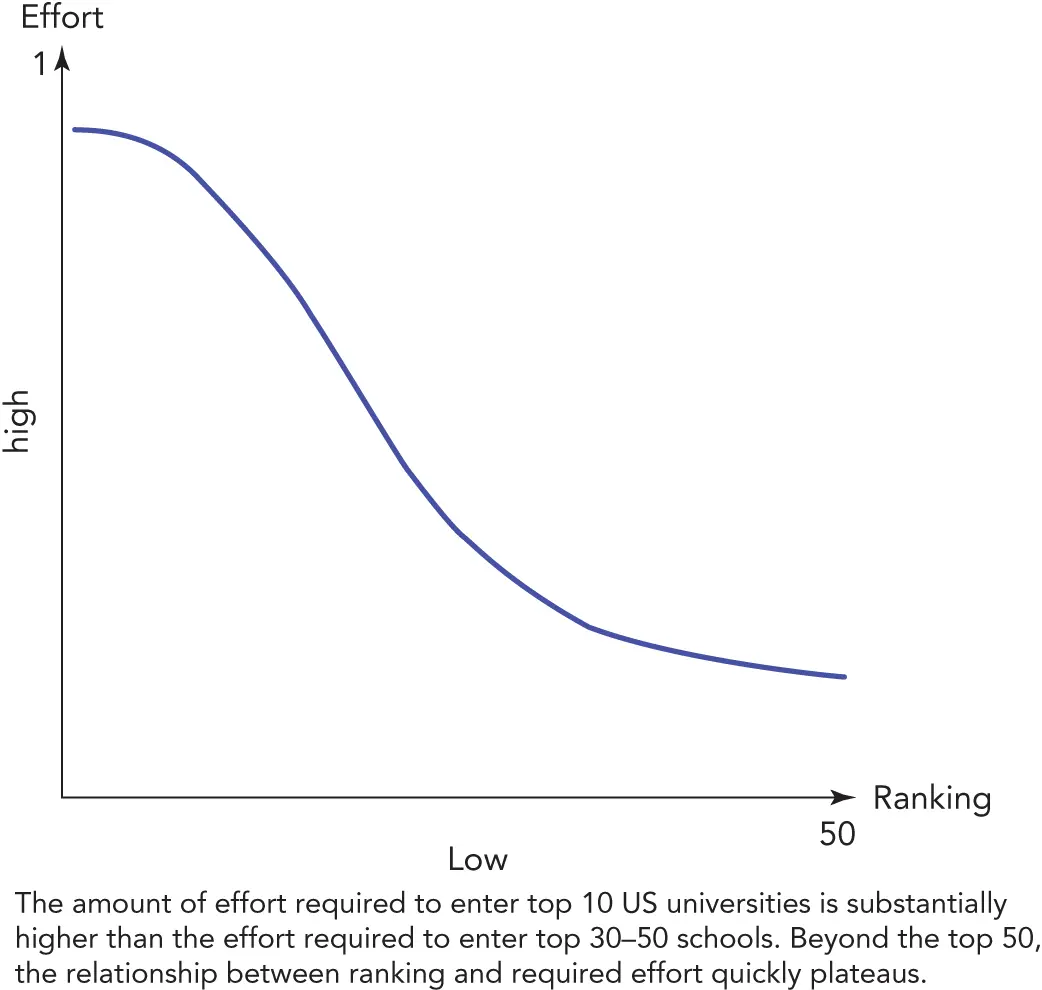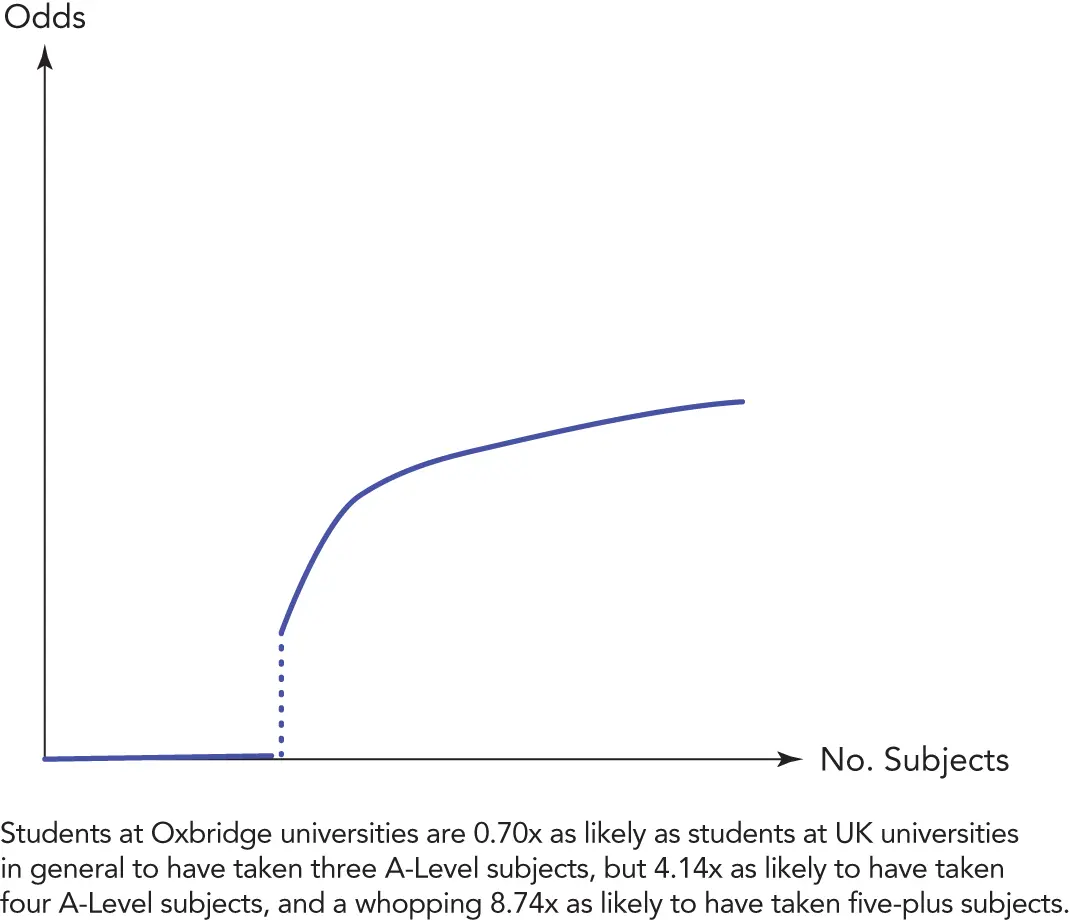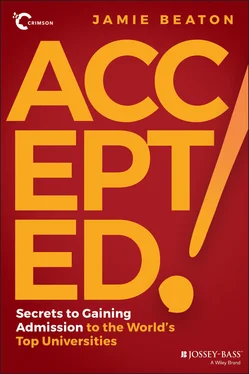Chapter 2 Class Spam: Deadly and Effective
Many students spend hours and hours trawling online forums, asking friends, mentors, and alumni of top universities: what activities do I do to get into a top university?
The best answer to this question is comically simple but brutally effective.
As an 18-year-old, I applied to Harvard, Yale, Princeton, Stanford, Wharton, and Cambridge and gained admission to all of them. I beat students who were smarter than me, had Mathematics Olympiad Medals, were head students of their school, and had a wide variety of other achievements. What was my strategy?
Take the maximum possible academic subject load and do more than any other student around you.
But what exactly does this mean? At my school, King's College, a well-to-do private boarding school where I was studying on a scholarship, the typical student would take three to four A Levels (in the Cambridge curriculum). 1 But I did 10.
Taking a subject load that was 2.5 times the median student and more subjects than anyone else in my school's history showed that on one very important dimension—academic capacity and work ethic—I was demonstrably able to beat everyone else. I didn't take on all that extra work simply to lay claim to this record, it wasn't about “winning” for the sake of winning. I simply had my sights set on top US or UK university admission, and at the time, doing more sounded like the best way to increase my chances of getting in. Which ultimately it did, and for other students still does. One of my students in Shanghai this year just finished his 17th AP subject. (Update: he was accepted into Harvard in the 2021 admission cycle.)
So why does this work? Many universities like Stanford seek to test intellectual vitality. 2 Broadly, this means they want to know that you are interested in a wide variety of fields, are open to discovering new subject areas, and that you pursue academic initiatives outside of school that you weren't forced to take in the classroom.
Naturally, you could try and show Stanford that you like business and economics by listing a bunch of books that you have read (I like AI Superpowers 3 and Freakonomics 4 myself), but what is the most efficient way to show you mean business? Take an accredited subject in that field. It could be AP Microeconomics, AP Macroeconomics. It could be A-Level Economics or A-Level Business Studies. This is the most efficient way to communicate to the university that you are passionate about the subject, trained in the subject, and cared enough to go through the ordeal of sitting a whole additional exam in the subject.
In high school, I took extra subjects in Further Mathematics, Mathematics, Biology, Chemistry, Physics, Thinking Skills, French, English Literature, Business Studies, and Economics. I took the science subjects, maths, and English in school (these subjects were referred to inappropriately as the “Asian 5” for being the most serious subjects) and then proceeded to take subjects such as Economics outside of school (“self-studied”).
Self-study , as I define it, refers to taking a subject outside of your traditional school. You could self-teach it, you could enroll in a part-time course offering like Crimson's online high school, Crimson Global Academy, or you could hire a tutor for it. The point is, you aren't taking it as a student in your traditional school. You're choosing to do extra.
Why is this strategy so effective? A university is trying to guess at who the most competent students are. When they read about your extracurriculars they may ask themselves, what does this mean? How legitimate is this organization? Did this really take much time? How passionate is this student? The main issue with extracurriculars and most other activities is there are very few universal standards that can clearly translate to an admissions officer exactly what you've done. (Not that extracurriculars are not crucially important to the college admissions process—they are, and we will get to that later. But they are viewed alongside your academic record, which you have to nail first.) When an admissions officer sees you've written an independent report on business in Japan, they will be intrigued but they will have limited comparability when they evaluate you against other students—when they place you head-to-head.
That is why this subject strategy is important. If you have completed 20 AP classes—and your best competitors have 17 or 15 all with similar grades, the university needs to actively find a reason to admit the other students over you. You will be the default pick because on the most clearly understood qualification you are ahead, and so on a risk-adjusted basis, your typical university will choose you.
If your school doesn't use the AP courses (in recent years a number of top US private schools have shifted away from the AP curriculum in favor of honors courses at the advanced placement level) 5 , then take extra credits at the honors and advanced levels—and ideally at a higher volume than your friends.
Of course, if you ask your teachers, your counselors and even most university admissions officers who are still employed by a university, they will tell you to calm down. You don't need to take so many subjects! That is totally unnecessary! Universities don't want to see kids spending all their time on exams!
But the reality is, after sending thousands of students to the world's best universities and analyzing more than a million college admissions data points, the information is clear. The more subjects you take and the more standard deviations above the typical caseload of your school, the more likely you are to get into a top college. If I had to go back in time and compete in high school to get into Harvard as a 13-year-old now, I would simply start early, take more subjects, and still make my intensive academic load a primary competitive advantage in my application. Bottom line, every piece of data shows that there is a direct correlation between effort and acceptance to these top schools—and the higher the rank of the school the more effort you need to put in (see Figure 2.1).
The same argument applies to top schools in the UK such as Oxford and Cambridge, or Oxbridge as they are collectively called (see Figure 2.2).
This brings me to the concept of “competency learning,” which is integral to your success. The system of modern schooling was built during the industrial revolution to efficiently push through large volumes of students to learn the same core skills in the same time frame.

Figure 2.1

Figure 2.2
This is generally okay for a typical student. But you are not typical. You are trying to get into one of the world's best universities. By necessity, you have to beat the curve. One of the best ways to do this is to throw the concept of time and year levels out the window. An international diploma called the International Baccalaureate (IB) 6 is quite popular with students and illustrates this point well. For example, in most IB schools, you take a fairly random curriculum up until the last three years. In the better schools, in your third last year (Grade 10 in the US) you might take the International General Certificate of Secondary Education (IGCSE) and then in Year 11 and 12 (your junior and senior years), you sit the IB Diploma.
This means you don't actually get any formal qualifications until the last three years of high school, and you don't even get your final IB exam results until after high school finishes, and after you've applied to college. The truth is, most students can actually handle much of the content for subjects like the AP, or honors, far earlier than they are traditionally encouraged to take them.
Читать дальше














